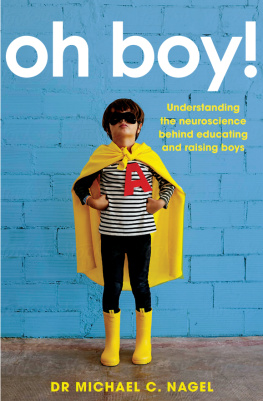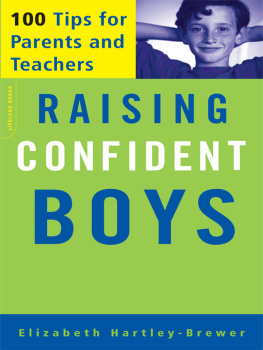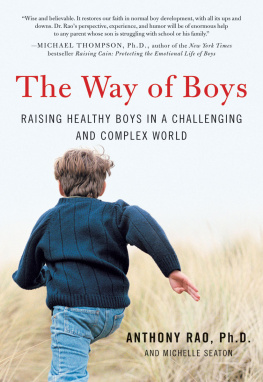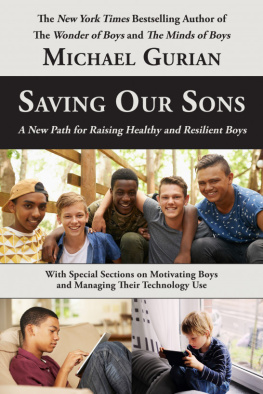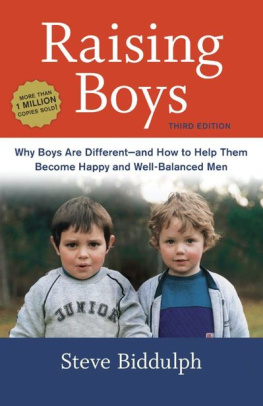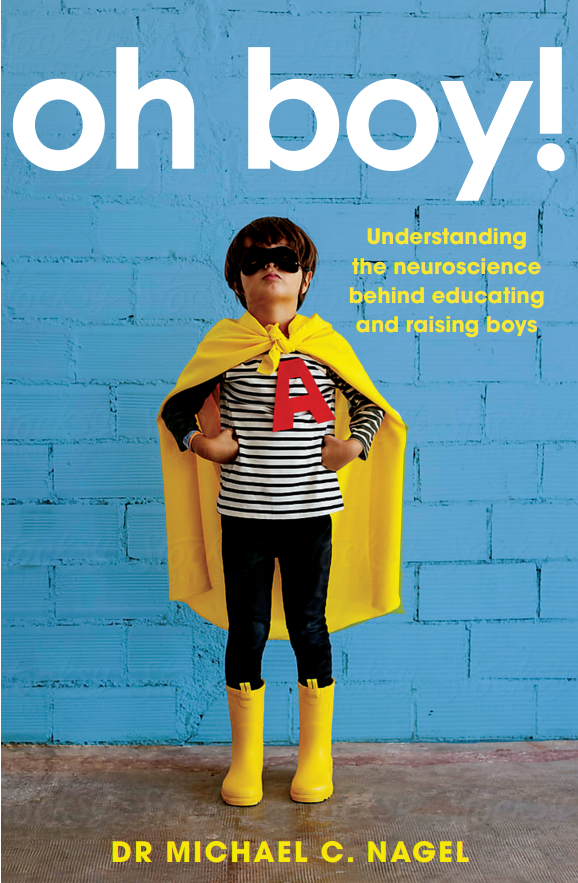Oh boy!
Understanding the neuroscience behind educating and raising boys
Dr Michael C. Nagel

Copyright Michael C. Nagel 2021
All rights reserved. No part of this book may be reproduced or transmitted in any form or by any means, electronic or mechanical, including photocopying, recording or by any information storage and retrieval system, without prior permission in writing from the publisher.
First published as Boys Stir Us: Working with the Hidden Nature of Boys in 2006 and republished as Educating and Raising Boys in 2020 by Hawker Brownlow Education.
This revised and updated edition is published by Amba Press in 2021.
Amba Press
Melbourne, Australia
www.ambapress.com.au
Editor Natasha Harris
Cover designer Alissa Dinallo
Printed by IngramSpark
ISBN: 9781922607065 (pbk)
ISBN: 9781922607072 (ebk)
A catalogue record for this book is available from the National Library of Australia.
This book is dedicated to my son, Harrison, or Harry as he is known to family and friends. My little boy yesterday, my friend today, my son forever. A fine young man who I could not be prouder of in all that he is and all that he does!
Acknowledgements
For all of my life I have been involved in education in some way, shape or form. During this time I have met many fantastic parents and teachers. I have also met many amazing boys and young men. Unfortunately I have also witnessed a worrying trend. Over the last few decades, and at a time of increased affluence, boys have continued to struggle in school and in many aspects of life. I have studied this as researcher and later with a vested interest as a father and found that boys do need help, mentorship and guidance. And while each boy is unique unto himself, all boys share many similarities in how they engage with the world around them a world that often fails to recognise or pay enough attention to a myriad of biological and physiological differences between boys and girls. Moreover, for some people even the notion of discussing the biological differences between boys and girls can set off a firestorm of condemnation wrapped in spurious notions of equality. Boys and girls are different and while some of this is shaped by our cultural and social norms, many differences are also the result of the complex nature of the chemical and structural aspects of the brain. This book explores those differences and draws on my experiences and the experiences of others who have helped shape my views, extend my knowledge and support my endeavours. To them I must say thanks.
First, my boyhood journey was not always smooth but I was blessed to have had four amazing friends help me find my way when needed. These boyhood friends became lifelong brothers who still influence my sense of self and my continuing journey in different ways as adults. To Bryan, Dan, Enio and Reg, I say thank you for being who you are and for your part in helping me become who I am in your own unique and special ways!
Second, it is important to acknowledge all those parents who do their best to raise fine young men. If only there were one manual for how to raise children life would be easier but it would also be much less interesting and rewarding. There is no magic bullet for raising children, but with patience and love almost anything is possible and most challenges manageable. Always remember, you are the foundation of everything your child needs to manage the ups and downs of life.
Third, to all the teachers who spend countless hours working to enhance the lives of all children, male or female, thank you! Your tireless efforts should never go unnoticed, and this is just my small way of saying you are appreciated and indispensable for so many boys!
Next, it would be remiss of me not to acknowledge the support of my university and thank all those at the University of the Sunshine Coast that I call colleagues and friends. And equally important are the people of Amba Press for refining my work and making it available to the masses. A special thanks to Natasha Harris for bringing greater coherence and clarity to my writing. And most importantly to Alicia Cohen for her openness to ideas, candour in thought, strength in conviction and continued faith in what I do.
And most importantly, to Laura, my best friend and partner in life a never-ending supporter of me. Thank you for grounding me and making my life beautiful!
Introduction
A war on boys?
All boys are human, even when there is reason to suspect the contrary. I mean that they are a fair sampling of humanity, with the right proportion of cheats, liars, dolts, heroes, and geniuses. A teacher finds it important to remember this fact.
Boys are, for instance, far more likely to harm themselves or to be involved in accidental death than are girls.
Boys will top the class in accidents and assaults and they will be the bottom of the class in literacy and learning.
as a group, boys are in trouble. Not every boy, not in the same kind of trouble and not all of the time but enough of them across all ethnic and socio-economic groups to know there is a pattern.
What is not in dispute is that boys need help.
Despite the fresh attention being paid to the problems of boys, many of the key indicators tracking how boys are faring, are getting worse, not better.
The quotes above do not paint a very pretty historical picture of boyhood. Even Plato himself has been credited with a degree of concern about boys in noting that of all the animals, the boy is the most unmanageable. In the 1940s when Jacques Barzun penned the first quote offered above, he became one of many individuals throughout history lamenting the challenges associated with raising and educating boys. Today there are contemporary reasons to be even more concerned about growing up male there is no shortage of evidence showing that boys lag behind girls in many measures of achievement and wellbeing. For example, the Organisation for Economic Co-operation and Development (OECD) notes that, worldwide, boys are more likely than girls to fail to attain a baseline level of proficiency in reading, maths and science. Such examples seem to suggest that boys are a problem, or at the least, problematic, which in turn often leads to agendas to fix the problem.
For some, fixing the problem of, or problems with, boys too often focuses on how aspects of masculinity do not align with proper educational and social conduct. Sociologists and sociocultural theorists, for example, argue that challenges and issues associated with boys are founded on the interplay of masculinity, social structures and cultural norms. Critics of such perspectives argue that these views often result in an agenda to change boys that quickly become an actual war on boys and boyhood. While there is certainly plenty of evidence to suggest that there may indeed be some kind of ideological war on boys or boyhood, there are also plenty of apathetic views related to boys. At the other end of the continuum, for example, can be found many who use the catchcry boys will be boys to explain inappropriate behaviour without any consideration of why that behaviour occurred! I would argue that both positions either omit, or fail to recognize, any notion of innateness in what it means to be male and, in particular, how such innate tendencies may be the by-product of the brain and mind. Therefore, perhaps it is timely to look at what a boy might actually be, or, more colloquially, what a boy might be made of. New advances in science and medical research allow us to go beyond the nursery definition of snakes and snails and puppy dog tails and offer a more contemporary perspective. In particular, the field of neuroscience has opened a whole new world of understanding the intricacies of being human and, indeed, being male.

